Cardyn Brooks's Blog, page 19
September 26, 2020
Murphy's Law #TWWBF2020 Zoom Almost-Doom Averted by Panelists Who Saved the Day
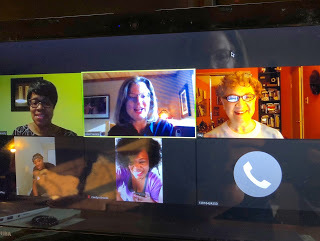
[Photo credit: courtesy of Alexi Venice 2020]
(Filed under the “Champagne Problems” category)
Panel Prep Checklist
Four talented panelists and one moderator in agreement on a date and time to record “More Than Tragic: Happy Endings, Adventure and Fantasy for All” chat?
Check.
#TWWBF2020 logo backdrop hanging on the moderator's wall?
Check.
Strong WiFi signal, functioning 100% charged tablet, and legible discussion notes?
Check—at least until an hour before start time, when the moderator's home Internet connection suddenly disappeared. Totally gone; wouldn't reboot. (Some people's nightmares are about falling. Mine are about dropped tech connectivity.)
Options?
Cry. Curse. (Are you kidding me with this right now, Divine Cosmic Forces of the Universe?!) Run to a nearby generous neighbor's house. Which friendly neighbor? The ones with the pack of adorable spoiled rotten yappy fur babies or the ones with the adorable rambunctious kids? Wait. COVID-19 social distancing mandates. So no to imposing on any kind neighbors.
Now what?
[“Nothing,” says my gloating Inner Hermit. “Embrace defeat. Engaging with other people is too risky! It requires lots of effort and expands vulnerability to rejection and failure. Who wants more of that?” My Inner Hermit is such a downer sometimes.]
Other possibilities whirled through my chaotic thoughts.
Use my cell phone?
Not optimal for moderating a Zoom panel.
A local public WiFi access spot!
(“Eureka" implied.)
Not indoors. (Again, social distancing mandates and other reasonable precautions, #@÷×%*!)
Parking lot at the public library! (Another of the many reasons to appreciate public libraries)
[Dash around the house like a contestant on Supermarket Sweep gathering up pages of notes, a tripod, tablet, earbuds with mic (2 sets), cell phone, mask, handbag, and keys before sprinting out the door to the car and zipping over to the local public library branch, then setting up everything in the back seat. All situated thirty-five minutes before the Zoom meeting start time!]
Awesome!*
Way to improvise. [Patting myself on the back]
*Until it becomes obvious as panelists join the meeting that there's something wrong with my audio, probably my earbuds (neither set works, even though both pairs worked perfectly as recently as the previous night!)! -two exclamation points instead of swear words (Evidently, premature celebration is a problem. Too bad there's no little blue pill to cure it.)
Fortunately, all of the panelists are confident and personable. They get to know each other as my frantic troubleshooting fails to fix the problem. A breathless roundtrip one-person footrace to a nearby store to buy new earbuds (brand name and purple(!), which seems like a positive sign from the Universe, but isn't because it…) doesn't fix my audio issues either.
Yikes.
Panicked feelings of being unprepared and unprofessional short-circuit my problem-solving synapses until Alexi Venice catches my spastic attention to remind me that calling in is an option.
Well, duh.
Add embarrassed, clueless, and forgetful to the list of panicked feelings.
Then finally, twenty-five minutes after the scheduled start time I'm dialed in (which is why my image includes my phone—as inadequate deep cleavage camouflage bonus, too late for tablet angle adjustment; plus, boobage is preferable to multiple chins), “More Than Tragic: Happy Endings, Adventure and Fantasy for All” began. Finally.
Pamela Beverly, Alexi Venice, Kamari Talley, and Gay G. Gunn mingled with each other and encouraged me as I stumbled toward a work-around solution for my tech issues. They didn't complain or bail. They were proactive, generous, and gracious professionals. They saved the featured panel discussion and rescued me with the integrity of their humanity and the power of their collaborative energies.
Please enjoy the lively exchange of ideas, opinions, and experiences in the conversation that followed.
And here's a coherent list of all the people and organizations I should have thanked at the end of the panel when encroaching darkness made it difficult to read my notes, and relief at having succeeded sent me into an adrenalin crash:
Heather Brooks, founder and Chief Wrangler-in-Charge of The Write Women Book Fest
Stacey at Marietta House Museum
Prince George's County Parks and Planning
Prince George's County Historical Society
The Maryland National Capital Park and Planning Commission (NOT Munici-whatever came tumbling from my lips at the end of the panel recording!)
Happy creating,
Cardyn
P.S. Zoom anxiety. Is there a support group for that? If not, starting one might be in my immediate future. Glass half-full thoughts: so thankful for being able to send and reply to emails related to the panel earlier that day, and for sticking to my habit of logging on at least an hour or more before a Zoom meeting when I'm the host.
September 20, 2020
Judicious Women, Authenticity, Crossroads & Legacies
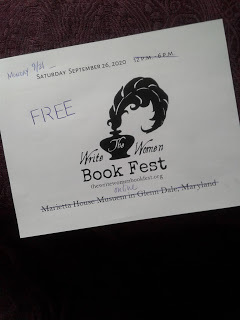
The loss of U.S. Supreme Court Justice Ruth Bader Ginsburg is devastating. All the heartfelt tributes are well-deserved, and have turned my thoughts toward consideration of the early years of her legal career at the ACLU and the Women's Rights Project. Without RBG and WRP then, would we now have women in combat in the U.S. military? The Lilly Ledbetter Law? Marriage equality? Federal mandates for equitable insurance coverage? And many more legal protections against sexism and other forms of discrimination?
The #TWWBF2020 More Than Tragic: Happy Endings, Adventure, and Fantasy for All panelists and authors of the following titles, and I, along with millions (billions?) more people have benefitted from Justice Ginsburg's life and work for human rights. Her existence improved the world and will continue to do so, which is a significant part of her substantial legacy.
Standby Counsel (Monica Spade #2) by Alexi Venice
Contemporary legal thriller romance
August 2020
After surviving assorted personal and professional upheavals in Conscious Bias, attorney Monica Spade is settling into her new law firm and her sizzling new relationship with high school art teacher and CrossFit devotee Shelby. Then a prank sets off a chain of events that obligates Monica to serve the legal advisory needs of a murder suspect with a hidden agenda and dangerous associates. Will Monica, her legal practice, and her romance survive? Standby Counsel takes readers on a wild ride filled with switchbacks and detours before arriving at the answers to those questions. A balanced mix of workplace dynamics, courtroom procedural drama, relationship tripwires, and layers of mysterious intrigue propel this engaging narrative. Monica's intrepid curiosity combined with distinctive characterizations of the supporting cast members create a believable sense of overlapping communities of connection and support. There's a fundamentally lighthearted undertone despite the serious themes addressed. Survivors of sexual assault may want to consider how far along they are in their recovery before they start reading Standby Counsel. Although the aftermath of a rape investigation figures prominently, a continuation of a comic thread from Conscious Bias offers some relief with a satisfying payoff in the conclusion. This second entry in the Monica Spade series builds upon the strong foundation of solid storytelling mechanics, memorable personalities, and interesting ethical quandaries established in the first story. In the author's note Alexi Venice asks if readers want more Monica Spade. This reader’s answer is yes.
Truth Is… by Kamari Talley
Poetic prose
2018
Recognizing oneself. Accepting oneself. Being honest with oneself and others. These simple concepts often seem impossible to execute in real life. If people are as sick as their secrets, then Mya, the narrator of Truth Is…, is nearly terminal on the first page. Meeting Adrian revives her in ways Mya hadn't understood were dying. This author's words breathe fresh emotive power into a familiar tale of self-discovery. Lyrical prose poetry floats along Mya's stream of consciousness observations and revelations.
Her smile met me before she even opened her mouth. [Page 4]
Mya's journey begins with a focus on sexual orientation, but quickly broadens into an examination of healthy versus unhealthy relationships with self and others. When Mya says on page 6, “…Truth is you liberate my mind, and you touch my soul…” her words encourage readers to ask themselves if their relationships do the same.
Near the conclusion on page 59 where Adrian says, “… I`m not perfect there are parts of myself that are under-construction but I want us to build…” it resonates as an echo of the essential truth that human beings are all works in progress. This author encourages readers to build upon the foundation of our most authentic selves. Doing so involves risk and yields great personal rewards.
[Note: The phrase, “chinky eyes" is used more than once. Although in context, it's clearly used as an endearment, not as a slur, some readers may find it problematic.]
Minor proofing: to/too, your/you're
The Love Labyrinth by Pamela D. Beverly
Contemporary romantic women's fiction
2017
Noelle Harrison is tired and frustrated. Her career-obsessed husband Wayne is rarely home, leaving her feeling like a single parent to their two young sons. Counseling, prayer—neither has solved the complacency and inertia that are killing her marriage. Then one Sunday Clark Johnson, a handsome younger man, approaches her. He says he wants to be Noelle's friend, but she can tell he wants so much more. Noelle needs to figure out what she really wants and the price she's willing to pay to have it.
The Love Labyrinth offers more than the typical messy love triangle. It portrays realistic consequences of broken trust and lack of honest communication. Plus, there's flirtation, sexy fun times, and enduring friendships with affectionate smack talk. Noelle's story also examines the challenges in making a clear choice that's necessary, yet still manages to wound everyone involved in some way. Healthy or failing, relationships consume time and energy. Noelle is forced to choose the direction she wants her life to go, and which man is the prime partner to travel that path with her.
One Day. Someday. Soon… (Culhane Family #1) by Gay G. Gunn
Historical literary fiction
2013
In the tradition of Alex Haley's Roots and Queenie, One Day. Someday. Soon… explores the circuitous, bumpy, lurching forward march of history through the Culhane Family. Their chronicle is global. Their struggles and triumphs are intimate, relatable, and universal. Identity, personal safety, purpose, connection, community, joy—regardless of nationality, skin color, age, gender or social class, humans seek these essentials. With lush language and immersive detail, this author infuses dynamic engagement into historical facts with complicated characters who reveal the layers within familiar cultural tropes of relationships between enslaved Africans and Indigenous North Americans, and the northern migration of southern Black people after the U.S. Civil War. Ancestors, Madears, aunties, foremothers and forefathers, and extended families by blood and by choice build strong villages and enduring communities that lay solid foundations for generational legacies. This story celebrates the physical, mental, and spiritual stamina possessed by each member of the Culhane Family, who through trials, errors, and tribulations establish ways to thrive, excel, and achieve while also savoring life's joy. The Culhanes embody the ideals of the American Dream.
September 1, 2020
#TWWBF2020 #WOMXNLITOUT2020 #reading OR #writing @thewritewomenbookfest
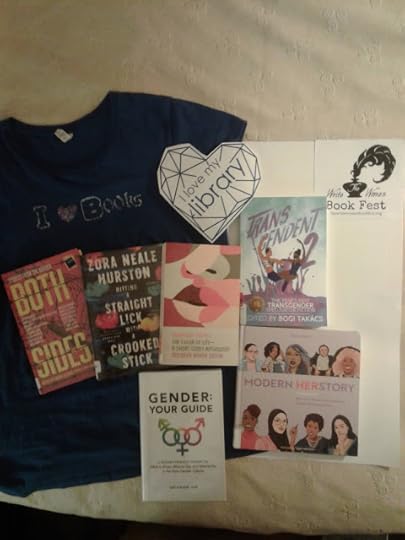
(My personal video highlights some benefits of reading anthologies, and falls under the category of "Do as the guidelines say, not as I have done."
August 29, 2020
2020 Third Quarter Roundup of Reviews in Limbo

Reading for pleasure, research, and for more than one professional outlet for book reviews makes it easy to lose a few submissions in transmission. Through absolutely no fault of their own, the following worthy titles' reviews didn't reach their intended online destinations earlier this year.
Vitality
Crysta Levere (Twitter: @LevereCrysta)
YA contemporary supernatural romance
Hot
August 25, 2020
Dangerous secrets churn beneath the veneer of small-town charm in Aberdeen, Massachusetts. Nineteen-year-old Ava has pulled herself up from abandonment and homelessness into being a student at Agatha College. A classified ad leads her to off-campus housing with Dahlila, a local, and friendship with her fellow designated Outcasts. Their small group ventures to an underground social club that pulses with sinister intentions. Soon, Ava's life becomes entangled with mysterious Layton's murky existence and hidden agenda. Their chemistry sizzles. Volatile confrontations, multiple mysteries, a sometimes unreliable narrator in Ava, and sliding timelines combine to make Vitality a whirlwind tale of obsession.
Loaded with young adult angst and declarations of existential philosophy, Ava and Layton's story also includes smooth integration of sexual orientation as a fluid trait, and references to mild kink. Moody atmospheric prose teeters close to purplish territory. Mixed metaphors, odd word substitutions, a few clunky scene transitions, and a pattern of discordant syntax in characters' dialogue distract from a strong premise and compelling intrigue that moves forward with accelerated momentum. More clarity in the initial setup would support a less jumbled sense of competing unknown key factors for readers to sort and understand. A thrilling, unpredictable conclusion establishes high expectations for Vitality 2 [sic]. Fans of Rachel Caine's Morganville series who enjoy more edgy menace and erotic intensity should devour this imaginative mix of supernatural lore.
Take a Hint, Dani Brown (Brown Sisters #2)
Talia Hibbert
contemporary romance
Hot
Avon, June 23, 2020
This irreverent, bawdy romantic farce blends slapstick and laugh aloud hijinks with poignant emotional depth and biting social commentary. It starts with an unconventional prayer. Doctoral candidate Danika Brown needs a new friend with benefits after her most recent “situationship" implodes. If only grumpy security guard Zafir Ansari were available for some no-strings action. Dani learns the Universe often has a sense of mischievous humor when it comes to answering prayers, especially when the supplicant isn't paying attention. Utterly charming romantic mayhem ensues.
As the second installment of the Brown sisters' trilogy, Take A Hint, Dani Brown manages to offer more laughs (and profanity) than Chloe's story as it continues addressing broader issues of racism, body-shaming, mental health, and the mixed bag consequences of social media exposure. Those concerns and more are smoothly integrated into a spritely narrative with provocative layers. Snappy dialogue, a celebration of sisterhood and womanhood, and men with nuanced emotional range inject additional complexity into themes of rejection and grief. Talia Hibbert's immense storytelling talents generate giddy satisfaction for readers and respectful envy from other authors. Dani and Zafir's story sets a high standard of expectation for youngest sister Evie's journey, which is scheduled for release in 2021.
Star Quest (#2): All That Remains
Patricia Lee Macomber
SciFi
Mystique Press, July 31, 2020
Warm
A few concise opening paragraphs introduce readers to the second installment of intergalactic adventures with Commander Cara Bishop and company. It works as a stand-alone in which crisis management is the focus and romance is mostly implied as Cara and her superior officer, Captain Steve Hunter, lead the Endeavor on an exploratory mission that crosses paths with a mysterious ghost ship. What happened? Where's its home origin? Answering these and other key questions while juggling the professional, technical, and personal demands of moving through space expands the scope of the mystery, and magnifies the interpersonal dynamics between the crew members.
Star Trek, Westworld, The Twilight Zone and more, this author's engaging space opera offers nods to staple tropes and themes in the SciFi genre with quirky fun. The tight, brisk narrative pace at the beginning starts to slow around the midpoint. Noticeable procedural oddities by crew members, and conflict resolutions that seem a bit too tidy detract from the strengths of distinctive characterizations, balanced integration of science and technology with messy human drama, and insightful world building. Star Quest: All That Remains takes readers on an entertaining imaginary jaunt.
https://www.smashwords.com/books/view...
August 27, 2020
#TWWBF2020 Monday, September 21st - Saturday, September 26th
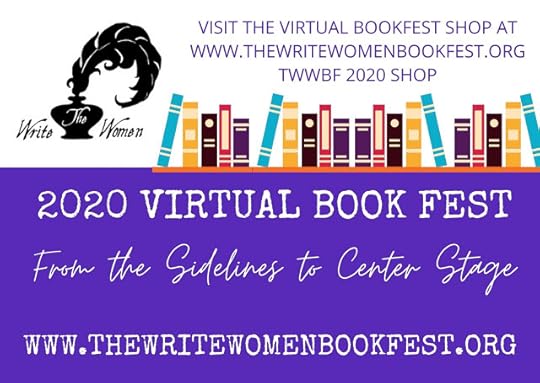
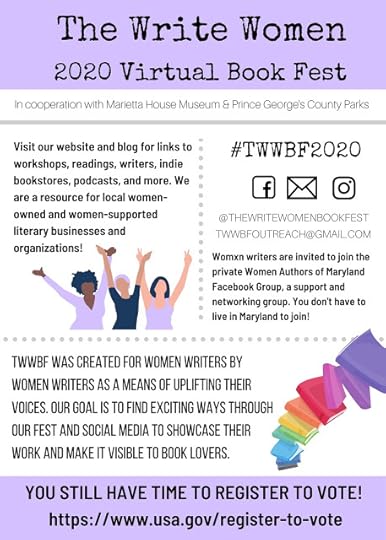
Drop in with us Monday, September 21st through Saturday, September 26th!
https://www.thewritewomenbookfest.org...
Check out Vikki J. Carter's interview with Heather Brooks, founder of The Write Women Book Fest.
https://www.facebook.com/Squishpen/videos/719981208846720/
July 17, 2020
Some Summer 2020 Beach Reading

Love Wins (Eventually):
Once Ghosted, Twice Shy by Alyssa Cole
Then Came You by Kate Meader
Two Rogues Make a Right by Cat Sebastian
Trauma, Recovery, Leaps of Faith & Cultural History:
Girl Gone Viral by Alisha Rai
Contemporary Culture Clash Drama:
Then, Now, Always by Mona Shroff
Historical Culture Clash Romance:
Forever My Duke by Olivia Drake
Repartee as Foreplay:
The Two-Date Rule by Tawna Fenske
First Comes Scandal by Julia Quinn
Books Nerds Collide:
The Write Escape by Charish Reid
Smooth Covert Operators:
The Cost of Honor by Diana Munoz Stewart
Forever Strong by Piper J. Drake
YA Fantasy:
A Court of Thorns and Roses by Sarah J. Maas
June 2020* (Bloomsbury reprint of 2015 original)
Eight years ago Fate turned its back on nineteen-year-old Feyre, her two older sisters, and her lame father. Keeping them fed becomes Feyre's responsibility, which she teaches herself to fulfill through trial, error, and some fickle luck. They're living on the edge in more ways than one. There's an invisible wall that separates the seven territories of the High Fae from the Mortal Lands and the Faerie Realms, but power-mad forces plot to undermine the centuries-old treaty designed to keep peace between them. A dangerous encounter between Feyre and a beast leads to a cascading series of consequences that redirect the course of Feyre's and her family's lives.
A Court of Thorns and Roses enchants readers from the first chapter. Feyre's indefatigable mental and physical stamina combined with her curiosity despite her pessimism and personal insecurities make her narrative voice compelling. Magical beasts, a curse, heroic sacrifices, a past race war on the verge of reigniting, and political factions competing for allies examine themes of tyranny, subjugation, and their cumulative momentum in chipping away at the ethical cornerstones of civilization. It's possible for readers who are sensitive to scenes of drug-induced compliance even when it's not sexual to skim or skip those few passages without losing the rhythm or comprehension of the escalating saga. This unself-consciously clever nod to ancient mythology and faerie lore will satisfy fans of Patricia Briggs, L. Penelope, and Lilith Saintcrow as inspired by J.R.R. Tolkien.
*Originally selected for Romance Daily News, but my enthusiasm generated by the story description plus a tight reading and submitting deadline equaled my not realizing this was a reprint instead of a first release, which is why this review is on my blog rather than RDN. Currently reading A Court of Mist and Fury, book two in this engaging series, for my personal enjoyment.
June 19, 2020
Juneteenth 2020 (& There's Still Strange Fruit in the Trees)*
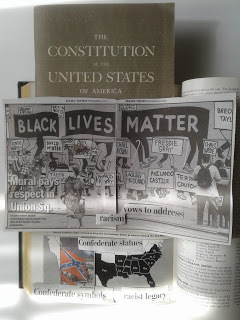
First line of "Strange Fruit" by Billie Holiday
Southern [California] trees bear a strange fruit...
What happened to Malcolm Harsch on May 31, and Robert Fuller on June 10, 2020?
There is a long, documented history of domestic terrorism in the United States. It started with the exploitation, subjugation, and annihilation of indigenous North Americans by invading missionaries and colonists who committed to a belief in their Manifest Destiny with violent dedication.
The Trail of Tears, the Bureau of Indian Affairs, Indian Schools, reservations, bombing Black Wall Street in Oklahoma; the internment of those survivors, lynchings, Rosewood in Florida, the internment of American citizens of Japanese descent during World War II, the Klu Klux Klan (and other Aryan Superiority Societies), unleashing police dogs and pressurized water hoses on American children of African descent during the Civil Rights Movement… These and other similar events are points along a continuum sourced from this country's fundamental ethical weaknesses of white supremacy and chattel slavery, dual expressions of racism.
Cornerstones of Racism
https://www.fatherly.com/news/killer-mike-is-americas-best-history-teacher-racism-geogre-floyd/
https://iowaculture.gov/history/education/educator-resources/primary-source-sets/civil-war/cornerstone-speech-alexander
Full text of Adolph Hitler's Stalingrad Speech, or any of his speeches, really.
The core hypothesis of white supremacy is that low-melanin skin is an indicator of inherent superiority over all other people in a preordained hierarchy of value and humanity, which is arranged from highest to lowest according to skin pigmentation (and gender, since pure white women are necessary in order to continue producing more white boys, who will grow up to become entitled white men). Therefore, every good and excellent human quality, every necessary resource, all desirable opportunities, and profitable endeavors are assigned to whiteness.
If this hypothesis were actually true, then every single Anglo/Caucasian/white person would be a genius because the conceit of white supremacy makes it clear that pale skin pigmentation is the primary indicator of innate superiority. For that claim to prove true, then every white person must be smarter than Katherine Johnson, George Washington Carver, Ursula Brown, Neil Degrasse Tyson, and every black or brown person on Earth.
Is every Anglo/Caucasian/white person you know or have encountered a genius?
What if we obliterated the old, outdated cornerstones of exclusion to replace them with an inclusive 21st-century Declaration of Independence?
We hold these truths to be self-evident, that all human beings are created of equal intrinsic value, that they are endowed with certain unalienable Rights, that among these are Life, Liberty and the pursuit of Happiness…
What if we rigorously followed the terms set forth in articles fourteen and fifteen of the U.S. Constitution?
Article XIV, Section 1:
All persons born or naturalized in the United States, and subject to the jurisdiction thereof, are citizens of the United States and of the State wherein they reside. No State shall make or enforce any law which shall abridge the privileges or immunities of citizens of the United States; nor shall any State deprive any person of life, liberty, or property, without due process of law; nor deny to any person within its jurisdiction the equal protection of the laws.
Article XV, Section 1:
The right of citizens of the United States to vote shall not be denied or abridged by the United States or by any State on account of race, color, or previous condition of servitude.
How much more ethically solid, strong, and stable would we be as a nation?
And to people who support and defend the presence of statues of Confederate leaders in public places of honor, my question is this: Do you recognize the core similarities between the cornerstone beliefs of the Confederacy and the Nazis? If it's immoral and unethical for Germany to celebrate Hitler and his followers (which they proactively addressed publicly as a nation years ago), then the same is true for the U.S. and Confederate leaders. The "Final Solution" era of The Holocaust lasted from 1941 to 1945. Legalized enslavement of people from African nations and their descendants lasted for nearly 250 years, of being listed in household ledgers with furniture and livestock, of being denied recognition as 100% human and full-fledged U.S. citizens, of building a nation without being compensated for their body-crippling, soul-crushing labors. That's what Confederate statues and the bars and stars represent—people who fought to continue using human trafficking and enslavement as the nation's primary economic engine for profit. Forever.
*This post surveys attitudes and environments that embolden people who move through the world applying racist, sexist, misogynistic, homophobic, transphobic, ageist, elitist, xenophobic, and other discriminatory beliefs to justify their mistreatment of other people; their violation of The Golden Rule. Recognizing and dismantling codified systems and entrenched institutions with inequality embedded into their foundations, not individual people, are the focus.
American Slavery: A Very Short Introduction by Heather Andrea Williams
Sister Citizen by Dr. Melissa Harris Perry
The African Americans: Many Rivers to Cross, narrated by Dr. Henry Louis Gates, Jr.
Slavery and the Making of America, narrated by Morgan Freeman
June 14, 2020
Let Me Breathe
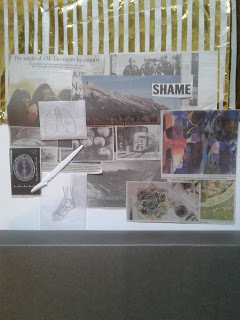
Two Women in One by Nawal El Saadawi
Translated from the Arabic by Osman Nusairi
literary fiction
Saqi July 2020
First published in 1985 during waves of Egyptian political upheaval with friction between nationalist and opposition factions and an economic depression, then reissued in 2005 in the swell of contentious elections and their aftermath, and now being published again in the wake of the worldwide #MeToo movement and the recent global expansion of Black Lives Matter, Two Women in One taps into the continuum of generations of the anatomy of systemic oppression in a narrative voice with present-day resonance. Following a dedication that warns readers about the under-reported martial facets of love, the foreword by musician and singer Deeyah Khan refers to Simone de Beauvoir's The Second Sex and that author's rational laments regarding the gendered indoctrination of women into femininity as a restrictive force that smothers individuality, condemning each of them to a fractured dual existence of acceptable public persona and turbulent inner truth.
This rebellious existential tale begins on Bahiah Shaheen’s eighteenth birthday, where she finds herself on the cusp of womanhood. Feeling caught between being a dependent child and an autonomous adult has her questioning everything: the composition of her identity, her body, her desires, her life's purpose. She's studying to become a doctor because that's her father's mandate, but she feels alienated from herself, her education, and her classmates. As she dissects corpses in the lab she deconstructs and examines her memories and beliefs. Her consciousness slides between reality, dreams, and imagination with increased speed and unpredictability. Shifts in perspective occur over time as shaped by experience and growing maturity. There's thematic repetition that conveys the monotonous routines of Bahiah's life, but each refrain adds new revelations as this surrealist fictional memoir spirals toward its conclusion. Contrasts dominate: expected versus unexpected, real versus unreal, belief versus disbelief, and making deliberate, consequential choices between sanctioned and unsanctioned behaviors. Women in particular and oppressed people in general who consciously choose to reject the “Mannerisms, gestures and meanings… alike to the point of suffocation" [pg.21] according to the dominant society's mandates often become targets for retaliation from the oppressors and their agents—officially commissioned and civilian, obvious and clandestine. Ghosts and corpses appear throughout Bahiah's sometimes fantastical dreamscapes that help her challenge society's imposition on her unique identity. When demonstrators chant “Egypt shall be free!” on page 96, the declaration reverberates beyond the citizens of one country to echo the determination of oppressed and disenfranchised people everywhere. At the same time in Two Women in One, there is a clear indication of the assumption by some of excluding women from realizing equal degrees of freedom as the men, even as the women suffer dire consequences while becoming agents for change. Osman Nusairi's translation flows like music in a mix of major notes about the bondage of restrictive societal expectations dictated by gender, and minor motifs on taboo subjects within Egyptian culture. Imagery that's sometimes whimsical and other times disturbing provides transitions that blur the lines between Bahiah's existence when she's awake or slumbering, until it's difficult for her to distinguish the boundaries of her increasingly dangerous reality. Bahiah's story is timeless in its portrayal of each individual's struggle to move through the world unmolested and in the form of their most authentic self.
June 7, 2020
Gearing Up for the 2nd Annual The Write Women Book Fest
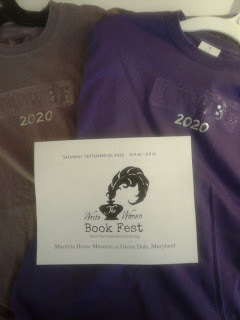
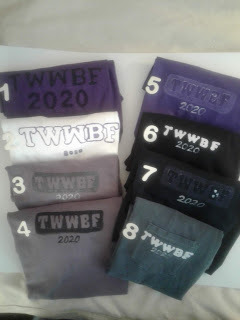
While BEA successfully took their annual celebratory publishing industry extravaganza online last month, and the National Book Fest plans to do the same this September, the second annual The Write Women Book Fest is still on for Saturday, September 26, 2020 from 12 noon until 6 p.m. at lovely historic Marietta House in Glenn Dale, Maryland. Limited maximum occupancy, one-way aisles, and other strategies are being finalized to create a safe environment for all. We're also expanding our online content and remote access to offer a dynamic virtual TWWBF experience.
And what's an event without a commemorative t-shirt?
Last year only five TWWBF2019 shirts were made as souvenir gifts for the founder and the four other members of the planning team. Providing a shirt to each volunteer is the goal for this year. The eight examples shown are the results of my experiments as distractions from the news coverage of social upheaval during the past weekend. If more overstock shirts are available in deep purple, then variations of sparkle (environmental impact of glittery fabric paint?) and black letters become first choice for easy visibility. In number two the first W is the actual letter and the second is an upside-down M, which is narrower at the top with one less serif, requiring less ink to trace it than the actual letter W. Shirts six and eight with the felt letters look more professional and (not surprisingly) are the most expensive and labor intensive due to purchasing the letters, then sewing them into place. Thankfully, those letters are adhesive. Final decisions contingent upon the colors, quantities, and sizes of available overstock cotton and cotton blend shirts. Are you a female author, female artisan, a booklover and/or curious human being who respects the equal intrinsic value of all other humans regardless of superficial traits? You're invited to join us at the second annual The Write Women Book Fest on Saturday, September 26th from 12 noon until 6 p.m. at Marietta House in Glenn Dale, Maryland. Thewritewomenbookfest.org
May 28, 2020
Celebrating Black Men and the Boys They Once Were (and Sometimes Forever Remain)
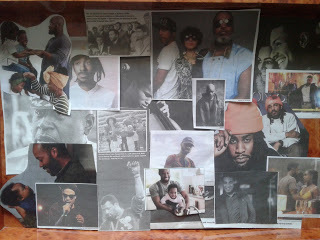 Today's post is a departure from my often light-hearted tone and brief word count.
Today's post is a departure from my often light-hearted tone and brief word count.Monday starts the month of June, in which fathers are acknowledged for their value to their families, their communities, and society. My love and appreciation for my dad, my grandfathers, uncles, male cousins, and other black men who are important to me have been at the forefront of my mind. Whether still living like my dad, two of my uncles, and my cousins or dead like my grandfathers and my dad's brother, all of their lives beat the odds that were, and still are, stacked against their existence.
My dad grew up in the Jim Crow South.
As a very young child he developed a heart condition, which doctors told his parents would likely kill him by his tenth birthday. My dad was ten years old when Emmett Till was murdered on August 28, 1955, a fact that makes me wonder if other potential external threats to his life ascended to the top of my grandparents' list of concerns for his health that summer.
When my dad reminisces about his childhood his words paint a mural filled with images of a working-class family united in faith and of modest financial resources as they confronted medical treatments, dire prognoses, the challenges of operating a small business, sibling loyalty and rivalry, love and joy, setbacks and triumphs. Because his parents owned a small downtown shop, my dad and his older brother were latch-key kids before that phrase was coined, and not entirely accurate for them since they rarely locked the door until the boys were old enough to be trusted not to lose the housekey. Close in age, my dad and his older brother were playmates, partners in mischief, confidants, each other's defender, and occasional adversary. Their segregated black neighborhood was surrounded by the larger, dominant Anglo/Caucasian/white population, which insulated them in some ways. Until he attended college all of my dad's friends, schoolmates, teachers, principals, mail carriers, doctors, nurses, clergy, and retail sales staff were black people. White people occupied the margins of his daily encounters during childhood.
Except for the time the bus let him off two blocks outside the safety of his community, and inside the Anglo/Caucasian/white residential neighborhood.
When a car filled with a group of teen boys spotted my dad walking by himself along the side of the road, they yelled slurs, warnings, and threats as they paced him. Angered by my dad's refusal to engage or to quake in fear, the driver gunned the engine and swerved toward my dad, who ran. Neither his heart nor his legs failed him. As he crossed into his black neighborhood, he sprinted onto the nearest footpath among the trees. “That's right, [slur]!” the teens yelled from the car windows as the vehicle squealed into a U-turn in search of a side street to cut off his escape. A long blaring of the horn punctuated the threat of their intentions before my gasping father collided with a friend and fell into his friend's arms. “Who you running from?”
“You're crazy!” my dad told his friend a few minutes later after he'd calmed and explained, while they both listened and watched for attack as they hunkered down in another friend's back yard. His friend made what seemed to my dad like a crazy plan. “They'll kill me if I go back!”
My dad's friend shook his head. “You're not going alone.”
Less than half an hour later my dad backtracked toward the invisible boundary that divided the two societies. When the teens saw him again, they chased him again, yelling slurs and threats; no more warnings as my dad ran back toward home. This time, when their car crossed deeper into the black community several of my dad's friends popped out of hiding to throw rocks, bricks, bottles, and cans at the moving vehicle, which jerked to a stop. “My daddy's gonna kill me!” the driver wailed at his stunned passengers before he shifted the newly dented car into reverse and started backing down the street as my dad and his friends yelled, “And don't come back!”
Fortunately, no one had a conventional weapon. The police weren't called. And those teens stayed out of the black community. What if they hadn't? What if someone'd had a knife or a gun and the inclination to use it? What if the police had been called to teach my dad and his friends and their neighborhood a violent lesson about defying the unwritten rules of an entrenched racist hierarchy?
Those questions haunt me in the present because different answers to them in the past could have ended my dad's life, or at least altered its course away from high school graduation, college, a teaching career, grad school, marriage, parenthood, home ownership, community engagement. Different answers then could have pre- empted my existence. Why were my dad, his friends, and I saved when Emmett Till was not? Trayvon Martin was not saved. Ahmaud Arbery was not. Too many other beloved black children of God were not. Chris Cooper survived his encounter with the police. George Floyd did not. Archie Williams endured 37 years of incarceration for a crime he never committed. Neither his voice nor his heart faltered.
At the beginning of his life my dad had a weak heart that grew stronger every day. Despite medical professionals and tests predicting his early demise, he survived and eventually thrived because his family fought to save his life. They did not stop until they'd won.
We, the human family, the coalition of antiracist beings, need to fight to save the lives of black boys and men. Their existence, their presence, their contributions are essential to the integrity of humanity. We rob ourselves when we steal their lives or allow their lives to be taken without significant judicial consequences for the murderous thieves. (Duh!!! Implied from every civil rights and criminal justice reform activist on the planet.)
During an early May episode of “Wendy @Home" D.L. Hughley said, “A black man is always the prime suspect in his own murder.” It's a fact that is long overdue for repudiation. It's not self-defense for an armed bully who hunts for an unarmed person to torment, then kill when their targeted victim fights to protect himself from assault; that's short-sightedness on the part of the dishonorable bully. Exonerating them is indefensible.
Motivations behind this stalking of black men in the United States reek of sour grapes. Now that the law of the land (at least) states that Americans of African descent are full-fledged citizens and five-fifths human, and entitled to being paid equitable living wages (in theory) for their labors, there's a dangerous, disgruntled, delusional minority (hopefully, minuscule) who believe exploiting, imprisoning, and stamping out humanity enrobed in blackness wherever it is flourishing in body, mind, and spirit is the solution to all their problems, disappointments, and failures. It's the ultimate scapegoating.
So please, let us as ethical beings, mobilize to cull the dangerous minority of trigger-happy, self-appointed Neighborhood Negro Watch vigilantes from the herd of responsible law enforcement and civilian owners of firearms.
The convictions of the former Dallas, Texas police officer who trespassed, then killed Botham Jean in his own home, and the convenience store parking lot troll who killed Markeis McGlockton in Florida are indicators that the arc of legal proceedings and verdicts that involve executions of unarmed black men is finally leaning toward justice.* They're overdue first steps on what is (but shouldn't be, should never have been) a very long path toward fair and equitable representation for all in the courts of law and public opinion.
Like my dad, the United States began its existence with a potentially fatal condition. This country's origins of enslaving human beings and justifying it by legally stripping those enslaved people of their inalienable rights and protections of being recognized as humans or citizens while singing its own praises as the land of the free is the source of its greatest hypocrisy and its weakness. My dad's family invested their time, efforts, intentions, and dynamic actions into conquering his illness and getting him healthy enough to thrive.
Their example challenges me to ask, “What will I do as a citizen of the judicially ailing United States?”
When my dad registered to vote for the first time, his parents paid the poll tax Negroes (commonly used term during his youth) were required to pay in order to access their implied (before the Voting Rights Act of 1965) right to vote. Although that fee is gone, other impediments have replaced it over the years. For those of us who love the United States enough to work to heal it even as we recognize its significant ethical frailties, continuous dynamic action is required. Registering to vote, informing oneself about the candidates, their voting records, and their campaign platforms, then actually voting generate engagement and declare people's intentions on moving forward toward—or backward away from—expanded safety, stability, and prosperity that lift our society from the bottom up to meet and exceed basic benchmarks of good health, food security, residency, education, opportunities, wages, and judicial equity that support our constant claims of being the best country in the world. Let's make that claim apply to everyone who resides here.
Please vote.
https://www.usa.gov/voter-registration
https://vote.gov
Why We Can't Wait by Rev. Dr. Martin Luther King, Jr.
Rest in Power: The Enduring Life of Trayvon Martin by Sybrina Fulton
“For Life” series based on the real-life experiences of Isaac Wright, Jr.
How Not to Get Shot by D.L. Hughley
The Chiffon Trenches by Andre Leon Talley
Just Mercy by Bryan Stevenson
The New Jim Crow by Michelle Alexander
The Double V by Rawn James, Jr.
*The majority of this post was written before the disturbing events in Central Park, New York City, New York and Minneapolis, Minnesota occurred.



